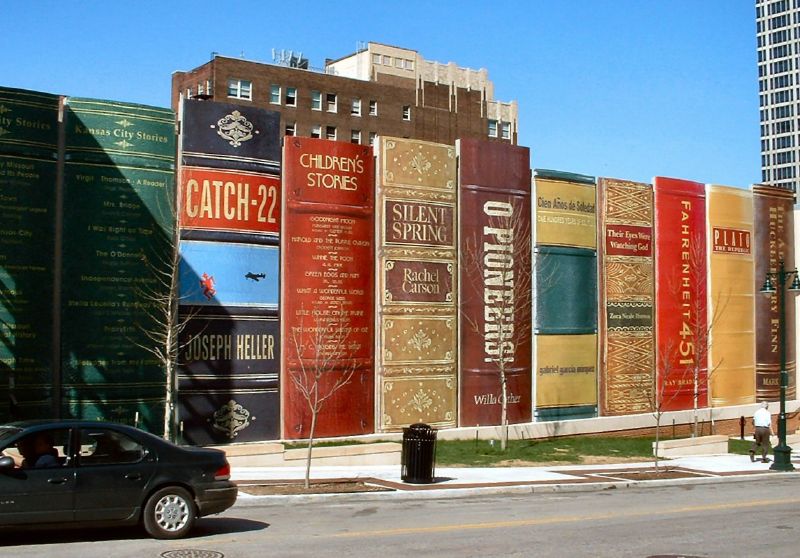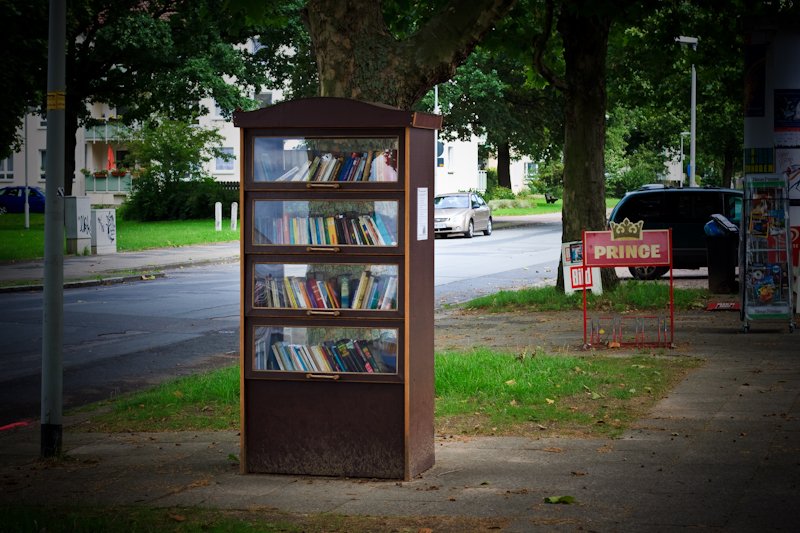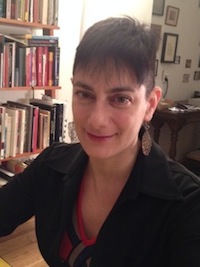
Kansas City Public Library. Credit: David Lee King (Flickr)
An interview with Public Books founder and Editor-in-Chief Sharon Marcus.
TBQ: How did Public Books come to be? Why develop a separate space apart from the journal Public Culture?
We launched Public Books to give scholars a chance to weigh in on contemporary culture at a faster pace than scholarly publishing allows, but with more rigor and more time for reflection than journalism usually permits.
We also wanted to give more academics an opportunity to write for a broad audience. Most of the existing venues for doing so are fairly closed shops, with the exception of the LARB. It’s also the case that many of those older publications have tended to construe “academic” as a dirty word, signifying obscurantism, bad writing, too much theory, too little sprezzatura.
By contrast, at Public Books we believe in what I call “scholarly value added”—the idea that expertise is a conduit to insight, not a barrier to it. Someone deeply knowledgeable about a book’s subject will have a more interesting and more informed take on it..
TBQ: Did you imagine it initially as a place for conversation or critique?
We’re academics, so conversation is critique. That said, we promote a range of stances towards the works reviewed. Appreciation is a difficult art. It’s a rare talent to be able to explain why a book is good, and I’m pleased that we often publish insightful reviews that do just that, such as Judith Butler’s essay on Anne Carson’s Antigonick, Nick Dames’s review of the Patrick Melrose novels, and Marah Gubar’s upcoming essay on children’s author E. L. Konigsburg.
That said, we also embrace polemic, debate, and critique, and we’ve run some pieces that have spurred vigorous debate—Simon During’s “Stop Defending the Humanities,” Harvey Molotch’s “Zero-Sum Urbanism,” Caroline Levine’s “For World Literature.” It’s also always interesting to feature a contrarian, dissenting view of a widely embraced book, though I never know in advance if our reviewers will be positive or negative. I asked Jonah Siegel to review Donna Tartt’s The Goldfinch for us because he works at the intersections of literary and art history, and he ended up making a very strong case for why it doesn’t merit the acclaim it’s received from critics and readers.
We also make space for think pieces that transcend the thumbs-up/ thumbs-down mode of reviewing altogether. Ian Baucom’s review of Chimamanda Adichie’s Americanah had a position on its quality, but Ian’s main concern was a much more interesting question—how is Adichie reworking realism? A forthcoming essay by Jan Mieszkowski on Karl Kraus is not just a confirmation of Kraus’s importance but also a thoughtful and accessible take on his complicated ideas about how language works.
Finally, we like to give authors a chance to speak for themselves, so we run lots of interviews.
TBQ: At a recent conference, you spoke on a panel, “The Semipublic Intellectual? Academia, Criticism and the Internet Age,” along with several other scholars who address their work as writers, critics, and editors to nonacademic audiences, primarily online. I found the panel’s premise to be timely and important and I was particularly struck by your responses to the moderators’ questions. You seemed to be arguing for a greater attention to working as disciplinary translators. Could you elaborate on this idea? What was your takeaway from the panel overall?
Many people on that terrific MLA panel spoke about the tension they’ve experienced between their academic writing and work in which they address a larger public—through print journalism, blogs, and television. I was struck by how many younger scholars saw public writing as a way to escape the constraints of academic jargon and the demands of scholarly annotation, and how many felt that they have to hide their more public work, even when it has a high impact or allows them to develop a distinctive voice.
I understand this tension, but I see Public Books as the equivalent of a powerful muscle relaxant. Call it crossing over without selling out; call it, to continue the physical therapy metaphor, cross-training for your writing muscles. It is possible to write in an engaging, accessible way that appeals both to a broad audience and to academic specialists. I like difficult writing, and I think it’s a virtue that most academics are willing to engage and admire difficult writing instead of rejecting it out of hand. However, just because some difficult writing is smart doesn’t mean that lucid, engaging writing is dumb. Think of Jane Austen. I also encourage our contributors to let themselves be entertaining. We would all do well to channel some of the rhetorical and storytelling tricks that make the novels, poems, plays, and films that we study so irresistible.
Most academics are quite skilled at explaining complicated books and ideas in ways that any intelligent 18-year-old could understand: we call it teaching. Public writing is teacherly, and teaching always involves translation. I knew we were doing something right at Public Books when my academic friends would say, “I loved that piece—it was just like reading something in the New Yorker,” and my friends outside academia would say, “That piece was great, in an intense kind of way—it reminded me of being in college seminars.”
TBQ: Can you point to a few past pieces/events and a few upcoming ones that you feel portray Public Books’ engagement with translation across disciplines and genres?
We’ve published great essays on translation as a process by Susan Bernofsky and Frédéric Boyer. We also ran a terrific piece by David Kurnick on Roberto Bolaño’s Consejos and Una novelita lumpen, which had not yet been translated into English at the time. I think of translation as discovery, and one of the best pieces we’ve published recently that led me to new discoveries was Paul Vandecarr’s interview with Laura Bolaños, who has been creating historietas, which are Mexican comic book romances, for decades. Early on we published a great essay on the Delhi literary scene by Rashmi Sadana and an interview with Lúcia Rosa about cartonera publishing in Latin America.
Looking forward, we have Rebecca Walkowitz interviewing Barbara Cassin, the editor of the French Vocabulaire Européen des Philosophies, recently translated as The Dictionary of Untranslatables. Madeleine Dobie has written a great essay about a recent translation of The Thousand and One Nights, one of the most translated works of the past several centuries. Frances Negrón-Muntaner will be writing for us about Manuel Ramos Otero, one of the 20th century’s most important Puerto Rican authors, whose work is largely not available in English. Nick Dames will be taking on a translation that turned into the sleeper hit of the past literary season, Karl Ove Knausgård’s My Struggle. We have a forthcoming essay by Tina Lupton on Nordic fiction, and Sarah Balkin will be writing for us about Rjurik Davidson’s Unwrapped Sky, which is Australian sci-fi.
In terms of genre, Jared Gardner regularly reviews graphic novels and comics for us, and we’re always trying to move between visual and textual cultures as well as taking a fair sampling of the popular, the middlebrow, and the highbrow. We also review digital culture. This can range from reviews of iPad literature to an essay in the works about Instagram selfies as a genre.
TBQ: Your web site describes Public Books as “created by and for a transnational community of writers, artists, and activists.” How do you define “transnational,” and how does it define you as Public Books?
I define transnational as comprising multiple nations and multiple languages and communities within each nation. This means covering the experience of people in the United States who weren’t born here, or who live here only part of the time, or who express themselves in multiple languages. It also means paying attention to the voices of immigrants and expats in the literature of other countries as well. I’d like us to keep doing more and more of this, and to publish more reviews of work published in languages other than English. We have partnerships with foreign cultural organizations and publications, such as Villa Gillet in France, and we regularly get requests to reprint our work from editors in other countries. Our readers come from the United States, South Africa, Australia, France, Germany, Poland, Brazil, and many other places—one of the wonderful things about publishing on the web and being open access is that it’s easy for transnational readers to find us.

Credit: h.chris (Flickr)
TBQ: Whose activist voices, in your view, do we need to hear most urgently raised in harmony with writers, artists, and academics right now?
The best art and politics expose us to new realities; the best theory comes from practice. Fiction, research, and activism are all visionary activities that combine ideas and action in surprising ways to change reality as we know it. I’d like Public Books to be a place where community organizers and researchers who work closely with communities regularly write about books, movies, and TV shows. This month we published a review of Jesmyn Ward’s Men We Reaped by Rinku Sen, who is the President and Executive Director of the Applied Research Center (ARC) and Publisher of Colorlines.com. In a couple of months we will publish a roundtable on the TV series Orange is the New Black that will include reflections by several academics whose research has been used by anti-incarceration activists and who have worked closely with prisoners and their families.
TBQ: What do you see as the best future for the genre of the review?
I’d like to reinvent the classic book review so that it includes both the vernacular reviewing underway in places like Goodreads and the data analysis and visualization increasingly underway in political journalism. I’d like to see Public Books become a place that connects world readers through a discussion forum; maps the award and receipt of literary prizes worldwide; and reflects on global literary scenes and reading practices by tracking the ebb and flow of translations.
TBQ: How involved have you been with the translations of your academic work into other languages? What was that experience like? How do you imagine or conceptualize the migration of your critical syntax into a new cultural/idiomatic context?
Sometimes I haven’t been involved at all—when I didn’t even know that my work was being translated, or could not read the language into which it was being translated. My essay “Fighting Bodies, Fighting Words” was translated into Spanish and Taiwanese, and my book Between Women was translated into Spanish. I’ve studied and can read Spanish but not well enough to advise a translator. At other times I’ve worked closely with someone translating my work into French, a language that I read and speak fluently. In those cases, I’ve had strong views about word choice and sentence cadence.
TBQ: You’re working on two projects on celebrity—a book on the history of theatrical celebrity and a special issue of Public Culture on “celebrities and publics in the Internet era.” Can you say a bit about each? How much do they overlap?
The book is focused on Sarah Bernhardt, the most renowned actress of the nineteenth century, and is very much a meditation on theatrical celebrity, on stardom before cinema. The special issue is focused on the contemporary moment, with essays on the Syrian revolution, Marina Abramović, reality TV, karaoke, digital entrepreneurs, and Instagram. The two are linked, though, because my perspective as a cultural historian makes me interested in what, if anything, is truly innovative about digital culture’s impact on celebrity.
TBQ: As a working scholar of celebrity, what to you were the most significant moments of this Oscar season and/or ceremony?
It was a pretty global year at the Oscars, with major awards going to Australians and to British and Mexican directors. The ceremony itself suggested that Hollywood is becoming somewhat irrelevant; a TV star hosted and the big moment was creating a photo for Twitter. As a scholar, I’m interested in how celebrity depends on combining live presence and virtual representation, so I was by how the most compelling moments of the show came from live performances that involved doing more than reading (or misreading) from a teleprompter. I’m thinking of Darlene Love breaking out into song when 20 Feet from Stardom won an award, or how much presence Pharrell Williams and Idina Menzel had in their more highly scripted, rehearsed performances. The film stars look great in their clothes, but otherwise didn’t fare so well by comparison, except when they staged the privacy-in-public on which celebrity thrives and ate pizza together.
TBQ: If you could stage a debate or conversation between two people, living or dead, who come from different backgrounds but embody what Public Books’ web site describes as its “model contributors”—scholars who write accessibly without sacrificing sophistication or depth, artists energized by research, and activists engaged with serious ideas”—who would they be and what would they talk about?
It’s hard to choose just two, but I’d enjoy hearing John Stuart Mill and Toni Morrison read and comment on each other’s work. Then I’d ask them to read all the books on the current bestseller lists of three different countries and discuss what they tell us about the state of literature and the state of the world. Then I’d ask them to live tweet while binge-watching Scandal, Borgen, and Girls.
•
 Sharon Marcus is Orlando Harriman Professor of English and Comparative Literature at Columbia University. She is the author of the foundational essay “Fighting Bodies, Fighting Words: A Theory and Politics of Rape Prevention” (1992) and of two prizewinning books: Apartment Stories: City and Home in Nineteenth-Century Paris and London (1999), and Between Women: Friendship, Desire, and Marriage in Victorian England (Princeton: 2007). In 2009, she co-edited a special issue of Representations on “The Way We Read Now,” and she has published many articles on literary studies, sexuality studies, and cultural history. The recipient of Fulbright, Woodrow Wilson, and ACLS fellowships, as well as a Distinguished Faculty Award at Columbia, Marcus is also a founding editor and Editor in Chief of Public Books.
Sharon Marcus is Orlando Harriman Professor of English and Comparative Literature at Columbia University. She is the author of the foundational essay “Fighting Bodies, Fighting Words: A Theory and Politics of Rape Prevention” (1992) and of two prizewinning books: Apartment Stories: City and Home in Nineteenth-Century Paris and London (1999), and Between Women: Friendship, Desire, and Marriage in Victorian England (Princeton: 2007). In 2009, she co-edited a special issue of Representations on “The Way We Read Now,” and she has published many articles on literary studies, sexuality studies, and cultural history. The recipient of Fulbright, Woodrow Wilson, and ACLS fellowships, as well as a Distinguished Faculty Award at Columbia, Marcus is also a founding editor and Editor in Chief of Public Books.
